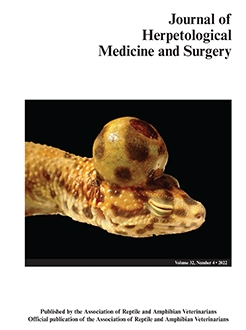The hypothalamic–pituitary–adrenal axis is often disregulated during critical illness or following traumatic injury, and both elevated and reduced glucocorticoid levels have been associated with poor prognoses in multiple species. In eastern box turtles (Terrapene carolina carolina), hyperlactatemia has been identified as a negative prognostic indicator, prompting the question of whether glucocorticoids become elevated in this species during hospitalization. This study examines the role of corticosterone in relation to lactate, other blood-based parameters, and triage scores during hospitalization of eastern box turtles with traumatic injuries on survival at 24 h, 1 wk, and 1 month. Eastern box turtles with higher triage scores had lower survival at 24 h and at 1 month, and lactate concentration at admission was associated negatively with survival at 24 h. Turtles in which plasma corticosterone levels increased in the first 24 h were more likely to die in the first week than turtles in which corticosterone decreased or remained the same, but this was not statistically significant. The results of this study demonstrate the potential role of the hypothalamic–pituitary–adrenal axis in survival of eastern box turtles with traumatic injuries.
How to translate text using browser tools
13 December 2022
Corticosterone, Lactate, and Injury Severity as Short-Term and Long-Term Prognostic Indicators in Eastern Box Turtles (Terrapene carolina carolina) with Traumatic Injuries Admitted to a Wildlife Rehabilitation Clinic
Emily K. Tucker-Retter,
Gregory A. Lewbart
ACCESS THE FULL ARTICLE
It is not available for individual sale.
This article is only available to subscribers.
It is not available for individual sale.
It is not available for individual sale.
Corticosterone
hospitalization
prognostic indicators
Terrapene carolina carolina
traumatic injury





